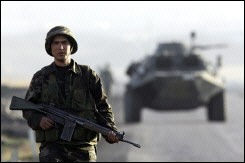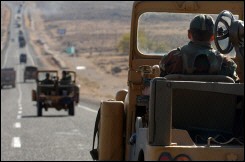
December 02, 2007 | By Abdel Hamid Zebari
ARBIL, Iraq (AFP) A leader of the Kurdistan Workers' Party (PKK) acknowledged on Sunday that rebel fighters had come under attack by Turkish helicopters inside Iraq but insisted they had suffered no casualties.

The commander, who spoke on condition of anonymity, had initially denied any attack when Turkey announced on Saturday that it had inflicted heavy casualties on a group of "50 to 60 terrorists" inside northern Iraq.
"There were helicopter strikes along the (Iraq-Turkey) border, but we suffered no casualties," the commander told AFP.
Turkey's Anatolia news agency reported that combat helicopters had targeted various locations in a bid to prevent Kurdish rebels from returning to rear-bases inside Iraq.
Speaking by telephone, the rebel leader said the PKK is "keen to resolve the crisis" and urged Ankara to consider a conditional ceasefire offer made by the group in October after its guerrillas ambushed and killed 12 Turkish soldiers.
Ankara rejected the ceasefire offer and received parliamentary authorisation in October to launch military action against the PKK inside Iraq.
Turkey has so far held back from any ground operation amid strong lobbying by the United States which is concerned about the impact on the autonomous Kurdish region of northern Iraq which is much the most stable area of the country.
But Turkey has warned Iraq that it reserves the right to resort to military action.

Among the conditions laid down by the PKK in its October ceasefire offer, the group demanded that Turkey enshrine the rights of the country's large Kurdish minority in its constitution.
It also wants rebel leaders in Turkish prisons to be released.
"If these conditions are met, we can give up arms," the statement announcing the offer said.
Iraqi Kurdish leaders on Sunday welcomed the PKK's desire to resolve the crisis.
"We welcome any initiative aimed at achieving justice and guaranteeing the rights of the debating parties," said Fadhel Mirani, head of the political bureau of the Kurdistan Democratic Party headed by regional president Massud Barzani.
"We all are suffering from this trouble."
Mirani urged both the PKK and Turkey to work towards a solution to the crisis.
"We do not want more trouble. We want to confront the problem with an open mind," he told AFP, adding that the issue can be solved only by peaceful means.
In recent weeks Turkey has deployed around 100,000 soldiers along its 380-kilometre (235-mile) border with Iraq.
However US Deputy Secretary of State John Negronte reiterated Washington's opposition to the PKK as a "terrorist" group as he wrapped up a six-day visit to Iraq during which he travelled to the Kurdish north.
"We all agree that the PKK is a very negative organisation, a terrorist group and it cannot be allowed to operate from Iraqi territory against the country of Turkey," Negroponte told reporters in Baghdad.
"So we share the common goal of seeking to end PKK activities once and for all."
Negroponte said that failure to end PKK activities could "jeopardise" the achievements in both northern Iraq and Turkey.
"So it is very very important that the PKK be effectively dealt with," he said.


